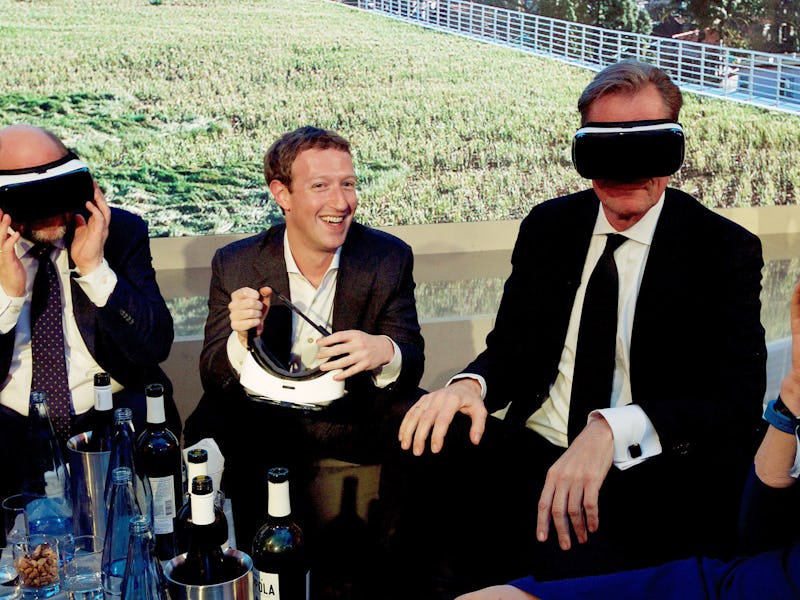Mark Zuckerberg Says We'll Share Thoughts Through Facebook in 50 Years
Beyond VR, users will share raw thoughts and feelings with each other.

If video killed the radio star, Mark Zuckerberg predicts the pure transmission of thoughts and feelings through the internet will one day surpass the virtual reality star.
“I don’t think VR and AR are the end of the line,” Zuckerberg predicted during his first ever Facebook Live Q&A Tuesday. “What’s beyond that?”
The Zuck put on his futurist hat during the event as Elon Musk and Jeff Bezos have been so willing to do this past week, and made some bold predictions about the technologies shaping our social future, all while chatting with Jerry Seinfeld.
“What I think we’re going to get to at the end of the line past VR is a world where, more than just being able to capture what’s going on in a scene, I think you’re going to be able to capture a thought.” Zuckerberg said. “What you’re thinking or feeling in its ideal and perfect form in your head (you will) be able to share that with the world in a format where they can get that.”
That’s a mind-bending concept, but Zuckerberg actually cited two points of research that are working on this very idea today.
How Facebook Might Read Your Thoughts
Zuckerberg made it clear that Facebook isn’t working on this technology (yet), but he seems excited about research coming out of the the University of California, Berkeley.
In 2011, Jack Gallant, a professor and researcher of cognitive neuroscience, debuted a model that allowed him to scan a person’s brain while watching a movie, and then, using those brain signals, was able to reconstruct the images the person saw. On Thursday, Natalia Bilenko and Valkyrie Savage of the Gallant Lab have developed an algorithm that further improves the program’s ability to reconstruct images.
“They can predict what you’re thinking about and what image you’re seeing in your mind’s eye just by doing the MRI and looking at the brain pattern,” Zuckerberg explained. “That’s obviously pretty far off and there are a lot of technologies and advances that are going to need to happen before that can be safe to use, and something that you actually want to do, but I do think that in the future we will have the ability to just capture a raw emotion or thought that we have and when you want and how you want.”
Imagine.
Sending Memories
Zuckerberg is also interested in how humans may one day share memories. He didn’t cite a specific study or university, but there has been plenty of research conducted on the memories of mice to suggest this is a possibility.
Scientists have discovered ways to delete memories from mice as if they were Jim Carrey in Eternal Sunshine of the Spotless Mind. They also know how to change bad memories into good ones and even insert false memories.
But Zuck used his live stream to talk about how researchers were able to transfer the memories of one mouse to another. The first mouse worked through the solution to a puzzle and then scientists “zapped” the memory to another mouse, so it could successfully solve the maze faster.
This of course comes with a lot of ethical issues, but Zuckerberg is certainly interested in the possibilities: “Having the raw ability over time to be able to share a pure thought or feeling — in the way that you want and give you control over that — is something 50 years from now may not be a crazy thing to think about.”